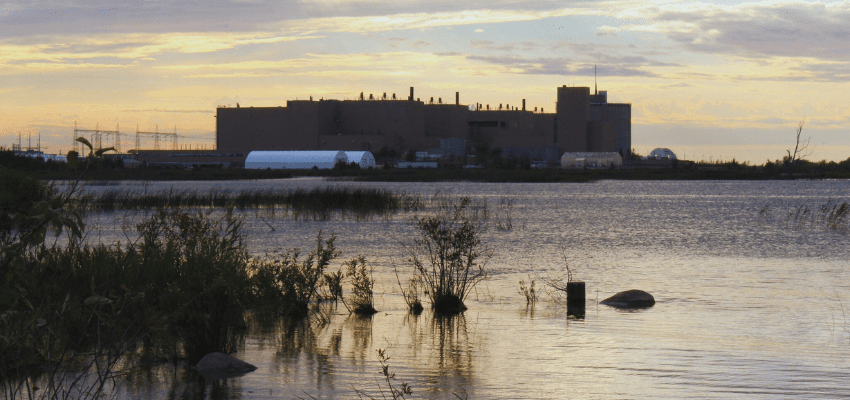By Sasha Istvan, August 16, 2024
When you think about Canadian infrastructure projects, what are the first words that come to mind?
Late and over budget.
Poor project management, regulatory hurdles, and market impacts make it nearly impossible to build any major project on time, and it’s a genuine surprise if something gets completed under budget. This doesn’t have to be the case: the Canadian nuclear industry is rewriting this narrative. Currently, two of Canada’s largest active infrastructure projects are in the nuclear sector – and they are on time and on budget.
Bruce Power, the world’s largest operating nuclear facility, and Ontario Power Generation’s (OPG) Darlington reactors are undergoing major refurbishments. The upgrades will extend the operating life of the reactors by 30 years.
These projects are complex, featuring intricate components, tight deadlines, numerous stakeholders, and detailed safety procedures. Several components are undergoing replacement for the first time in the stations’ operational history, requiring today’s engineers, machinists, and technicians to figure out how to fabricate parts that have been out of production for decades. Refurbishments add a layer of complexity compared to new builds, as operators work around existing radioactive systems and engineers must design replacements for obsolete parts. Despite all this, both projects remain firmly on track.
Bruce Power refurbished Unit 6 ahead of schedule and on budget in 2023. The current Bruce Unit 3 refurbishment is well underway and the reactor is tracking to return to service on schedule in 2026; indeed, Bruce Power recently completed the Unit 3 removal series earlier than planned. Its remaining four units will eventually follow.
OPG has successfully refurbished two of its four reactors, Darlington 2 and 3. The Unit 3 refurbishment finished 169 days ahead of schedule, in July 2023. According to OPG’s 2024 Q1 update, Darlington Unit 1 is tracking to be completed three months ahead of schedule, and the final refurbishment, Unit 4, is expected to finish by the originally scheduled date of February 2026. The entire project is still on pace to meet its $12.8-billion budget – despite the cost inflation and COVID-19 disruptions that stymied many other major projects in Canada, such as the Trans Mountain Extension (TMX) pipeline, Toronto’s Eglinton Crosstown LRT extension, or the BC Hydro Site C project.
At the same time, OPG is also building North America’s first fleet of Small Modular Reactors (SMRs). The first of four planned reactors is scheduled to come online in 2029, and by all accounts, the project is tracking to meet that goal. OPG completed early site preparations this spring on time and on budget. OPG’s efforts highlight Canada’s ability to multi-task when it comes to nuclear power – we can conduct major refurbishment projects while also building the next generation of nuclear reactors.
Many other jurisdictions can’t make the same claim. For instance, Vogtle Units 3 and 4 in Burke County, Georgia, Finland’s Olkiluoto Unit 3, and Hinkley Point C in Somerset, England, are all sufficiently late to warrant attention and concern. With these projects dragging on for 10, 18, and 15+ years respectively, it is easy to be pessimistic about prospects for building new reactors at pace. But globally, these projects are the exception, not the rule. Over the last ten years, China has built 34 nuclear reactors, with an average construction duration of 6.3 years; South Korea has built five in an average of 8.8 years; and Pakistan has built four with an average of just 5.6 years. Part of this success can be attributed to growing nuclear expertise, applying lessons learned, and repeating builds of the same design.
Canada is already doing this, as our active projects demonstrate. OPG refurbished Unit 3 faster than Unit 2, and part of the rationale for building a fleet of four SMRs is to take advantage of repetitive builds. Having established itself as an expert in the field, OPG attributes its success to careful planning, a unified team, and a “made-in-Ontario” approach. Preparations have included training operators on a full-scale reactor mock-up and planning with stakeholders to align on safety, quality, schedule, and cost goals. Leveraging the local supply chain capitalizes on the province’s nuclear expertise and strengthens it for future builds.
Bruce Power is applying the lessons learned from the Unit 6 refurbishment to keep Unit 3’s refurbishment on schedule. Like OPG, Bruce Power has also built a state-of-the-art operator training facility and is using automated tools to improve the safety and schedule performance of the project. This will help it achieve a progressively shorter refurbishment schedule for each subsequent unit.
The recent success of Canadian nuclear power projects speaks volumes about the industry’s preparedness and competitiveness. It proves the capability of Canadian nuclear workers and the supply chain. The Royal Academy of Engineering and the World Nuclear Association have studied how to set up a nuclear project for success. They highlight the importance of establishing a knowledgeable and competent team, proper planning, and appropriate contract structure. The Bruce Power and OPG refurbishments are models of this approach.
No major project is flawless, and there’s still potential for Canadian refurbishments and new SMR builds to veer off course. However, as we ramp up nuclear construction, there’s reason to believe these projects will buck the trend that seems to haunt every other major infrastructure endeavour in Canada – proving to skeptics that nuclear can be built at pace.
Sasha Istvan is an engineer based in Calgary, with experience in both the nuclear supply chain and the oil and gas sector.






